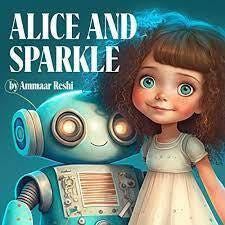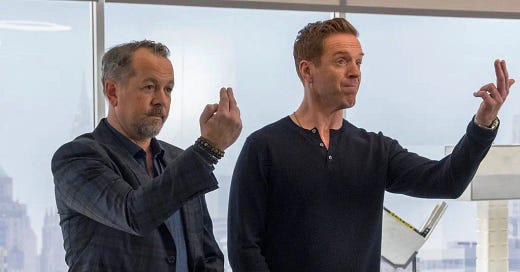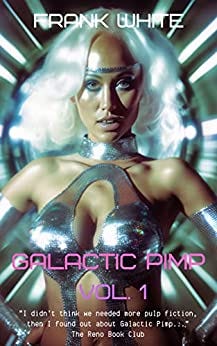Making Sense of the New I.P. Headlines
Klutzy A.I.-novels, ad-besieged audiobooks, romance novel bias, and the reason Paramount bucked a $3B offer for Showtime

Hi. Welcome to The Optionist and thanks for reading! Catching up today on a few pressing matters I wanted to flag for readers — the wobbly state of AI-created content, some important takeaways from a recent podcasting forum and the growing IP upside of the romance novel.
The ChatGPT Revolution Will Not Be Televised — Not Yet

With ChaptGPT blowing up so big these past few weeks, it was inevitable that all sorts of sharpies would begin peddling AI-generated books on Amazon, creating a kind of Publishers Clearing House for mindless junk. The AI authors of this hokum should be ashamed of themselves, but probably won’t be — until the capacity for a guilty conscience has been added to their code.
As of weeks ago, Reuters tallied up more than 200 AI-generated books already on Amazon, spanning kids’ stories to advice to poetry. Most of them sound... awful. Take the AI-authored Galactic Pimp: Vol. 1, about alien factions in a galaxy far, far away, warring over a human-staffed brothel. This simulated shlock carries a price of $1, which pretty much amounts to highway robbery. Reassuringly, sales so far have pretty much sucked. Interviewed in late February, Brett Schickler, who used ChatGPT to generate a children’s book about financial literacy titled The Wise Little Squirrel: A Tale of Saving and Investing, acknowledged that it had netted him less than $100.
There seems to be a small bump in quality when actual writers plug in the variables. Take manga king Eiichiro Oda (One Piece) who on a lark used ChatGPT to generate a plot for a new manga. Oda labeled the first effort "boring" and sent it back so the artificial author could take another crack at it. Not sure how much better the second effort was than the first, but apparently it was enough for Oda to begin drawing the story, which will be published in Japan this summer.
Literary magazines are suddenly drowning in artificial unintelligible short stories. The sci-fi magazine Clarkesworld was so overwhelmed by AI-generated submissions — some 500 in February — that it had to shut its submission portal to all authors, humans and robotic. Clarkesworld publisher Neil Clarke likened the material, which he called “bad in spectacular ways," to the literary equivalent of spam.
Sounding the alarm most stridently is Mary Rasenberger, executive director of the Authors Guild, who’s being quoted in multiple pieces. She raises ethical concerns ("These books will flood the market [and] a lot of authors are going to be out of work"), cultural concerns ("We want our arts to be human artists reflecting their hopes and fears about our current world") and civic concerns ("Books are the arteries of democracy").
While few would argue that Fifty Shades of Gray and its sequels did much to circulate the lifeblood of our republic, at least they weren’t the literary equivalent of a pulmonary embolism, which AI-generated books, at least at this early stage, most certainly are.
For me this kind of doom-casting recalls the panic that greeted the arrival of self-publishing in early 2000s. Publishing's traditional gatekeepers bemoaned the loss of quality and worried that it would destroy books as we know them. But I would argue that on balance, self-publishing has been a good thing in the long run. It has lowered the barriers to entry for writers and created new markets. It’s become a complement to traditional publishing — not a replacement for it. Experience has also shown us the many things that self-publishing can’t do well. For example, non-fiction books, where gatekeeping for reliability remains crucial. And while there's clearly a lot of dreck out there, it has also produced some genuine hits like Still Alice and The Martian, both of which were turned into major movies. All of this is a way of saying that while AI-created literature might be disruptive and needs to be managed, it doesn’t necessarily mean the end of human authors or a cultural apocalypse.
The phenomenon of AI-generated books raises lots of questions of ownership and authorship that we don't have good answers for yet. For example, who owns the copyright to an AI book? The U.S. government has said such works aren't eligible for copyright because only human-created material qualifies. Since AI output is only as good as the material pumped into it, do human facilitators deserve any fee/credit for AI books generated under their aegis? If there’s only partial compensation, who gets the rest? And how does that translate to who gets paid for the IP? Having never received an F for, say, copying and pasting The Great Gatsby’s Wikipedia page into a ninth-grade book report, AI seems to have few qualms about ripping off the work product of mere mortals, especially when it comes to illustrations. Artists have complained that drawings in books like Little Squirrel or Alice and Sparkle, another AI-generated children's book, are close to plagiarism.
However, if Galactic Pimp provides any indication about where the state of AI fiction is at, we can put off all these conundrums for later day. Get a load of this passage, taken from Vol. I: "With fierce determination, Kashmir turned on his heel and stormed out of the main bar and into his private quarters, look for a fresh bottle of Yebbe or [sic] gorge upon and dull his raw emotions." Oy.
This Audiobook Brought to You By…
There were a couple of things that came out of The Verge's Hot Pod Summit in Brooklyn a week ago that I want to shine a little light on. First was a conversation about the blurring between audiobooks and podcasts. A related discussion also arose about the viability of limited series narrative podcasts.
Audiobooks are a sneaky yet significant source of revenue for publishers and authors. Up to now, there have been two payment/delivery models: Either purchase a title à la carte or subscribe to a service like Audible. At the summit, Nir Zicherman, Spotify's head of audiobooks, hinted that the company will be offering a third option: free titles freighted with advertising. While this financial model proved ideal for broadcast television, it has never gained traction in the book industry, though a few publishers have tried. (Of course, left out of this conversation is the public library system, a criminally undervalued asset, where anyone can get pretty much borrow any popular audiobook for, wait for it, for no charge — without subjecting oneself to a torrent of commercials by the likes of Burger King or grubhub.com).
It's possible that consumers will accept audiobook advertising since it is more akin to podcasting than publishing. But there's a real danger in this for both publishers and authors. Audiobooks are the fast-growing segment of the book market, up more than 100 percent in the last five years. In the U.S., sales have risen from about $750M in 2017 to about $2B in 2023. And the worldwide audiobook market is expected to grow from its current $6B to around $35B by 2030. The margins on audiobooks are comparatively high as well — no paper costs, no printing costs and relatively minuscule distribution costs.
The digital revolution has shifted the upside from individual creators to tech companies, and this is doubly true when it comes to streaming. Think about what’s happened in music, where streaming has been a boon for Apple and Amazon, and a bust for musicians. You could argue that the impending showdown between the WGA and producers is a variation of this problem. Anything that makes the already tough economics of book writing, especially non-fiction writing, harder could shrink the pool of authors and their work.
As The Happiness Project’s author/blogger/podcaster and Hot Pod panelist Gretchen Rubin observed, writers should be wary of how these new ideas could devalue their novels and non-fiction. “On the one hand, a listener might really like advertising support, because then that means it’s free to them. So that could bring in people to my work that wouldn’t otherwise get it. On the other hand, we all know that if people are used to paying for something, you would rather they keep paying for it, rather than starting to give it to them for free. Because once people give something for free, it can be hard to reel that back.”
Another interesting panel centered on the economics of limited-series narrative podcasts. (Nick Quah, who was supposed to host the panel but got snowed in, wrote a great piece on this for Vulture last month that I highly recommend as well.) As podcast executive Kate Osborn noted, a single season of a narrative podcast costs a minimum of $250K to make and often more if it requires travel or a lengthy investigation. Those financial needs make it tough for anybody but the big players to finance one.
John Perotti talked about his decision to take a risk by self-financing Welcome to Provincetown after getting no interest from major podcast production houses. It turned out to be a good move for him because the show was hit and when it was optioned for TV, the payday was his alone.
But — and here's your key takeaway — Perotti also cautioned against placing all bets on the "lottery ticket" of a Hollywood option, and instead urged his audience to think broadly about diversification. “The IP game is great, but that’s not all it is, right?” he said. “It could be a play, it could be a live show, or literally a physical product… doing all of those things together, I think, makes sense.”
This strikes me as shrewd advice for anyone with non-fiction IP, whether creators, producers or executives. In today’s market, nothing should be thought of as just one commodity — just a book, just a podcast, just an article — but as something that can be iterated across multiple media to deepen its value and its reach.
Read about this and other panel discussions here.
What Hollywood Can Learn from Romance Novels

I find it curious romance novels have been so underexploited by Hollywood, given strong book sales and the popularity of the rom-com. Beyond their core audience, romance novels are routinely greeted with snickers and eye rolls. If a particular work is sentimental, it’s dumped on for its Hallmark Christmas movie qualities — too saccharine, too clichéd, too many ridiculous coincidences bringing the lovebirds together. If the book’s steamy sexy, it’s branded an embarrassment, as was Fifty Shades of Grey — by legions of insecure middle-aged husbands at least.
As it stands now, romance novels that do break through the IP barrier either aren't respected (The Notebook) or aren't really characterized as romance novels — think the Fault in Our Stars or The Time Traveler's Wife. One of the reasons I really liked this Publishers Weekly piece previewing this year’s romance novels is that it gives the genre such serious consideration, analyzing trends in the genre and a documenting a new willingness by publishers to rate the level of sexual content in a given book.
I was reminded again about just how diverse romance novels are. You've got cute contemporary, kisses-only, second chances, traditional/historical, comedic, queer, adventurous, slow-boil sultry, or just tear-your-clothes-off carnality. There’s a lot of great stuff here, so why the Hollywood cold shoulder? A patriarchal double-standard is at least partly to blame. Still with us is the sexist mindset that regards the sensual fantasies of lonely middle-aged women as pathetic, and the sensual fantasies of lonely middle-aged males as perfectly understandable, and even — ugh! — worthy of a few high fives, when the audience is stacked with bros. The media is often surprised at the success of someone like Colleen Hoover, whose romantic thrillers dominate the bestseller list. But rather than see her success as an aberration, view it as indicative of the IP potential of the genre.
It's also interesting to see how romance editors are both pushing against the same biases we see in films and leveraging those biases to spice up their marketing. Here's Erika Tsang, editorial director at Avon: “From time to time, we’re asked by booksellers and bloggers if we would consider putting a rating system on the book. We go back and forth. What I find really, really hot, another person may not. So my five hot peppers could be somebody’s three peppers. That’s been really hard to communicate.” (Sure, but the good folks of Pace Foods have been labeling their picante sauces by this subjective yardstick for generations, and guess what? It works just fine.)
Thien-Kim Lam, author of the just-dropped Full Exposure, seems free of such compunctions. Her subscription service, Bawdy Bookworms, leaves no room for ambiguity, pairing each title with a relevant sex toy.
There’s a lot of food for thought here. First, there’s much to learn about how publishers are trying to market the genre — what kind of signals are you sending to the audience, how do you calibrate the right amount of explicitness for a screen adaptation. Second, the breadth of romance novels should encourage creators, especially in TV where audiences have become more niche, to see opportunities far beyond the Nancy Meyers universe of wealthy straight white people smitten by Cupid. Third, I think there’s an audience for more explicit romance. I don’t mean gratuitous nudity and sex, but scenes where the sex really feels integral to the plot.
If you’re still in doubt, take another look at Fifty Shades of Grey’s stats. The film cost $40M to make, and did almost $570M at the box office. What’s more, from a financial standpoint, 2022’s corny Hallmark Christmas lineup was nothing to sniff at, raking in $350M last yuletide. Money hasn’t been talking loudly enough when it comes to considering the IP upside of romance novels. It’s about time it did.
Read the whole piece here.
A Price Beyond Billions
The story that Paramount had turned down David Nevins’ $3B offer for Showtime certainly snagged my attention. (The Wall Street Journal broke the news, while Indiewire added some additional context.) The story has raised a lot of chatter about whether Paramount is or isn't a takeover target, and about just what Shari Redstone's long-term plans might be. Setting all that aside for a sec, I want to drill down on just one aspect that speaks to the value of pre-existing IP in today's marketplace.
Paramount Global is currently valued around $15B, so a $3B boost in its market cap would certainly have cheered shareholders and impressed Wall Street analysts. Moreover, the offer came at a time when Paramount had begun scaling back Showtime's work product and folding its operations into the streaming service Paramount+. And still Redstone said no. Apparently she and her team still believe there's more than $3B of value embedded in a relic of the premium cable era that seems bent on reducing its flow of fresh content to a trickle. They may well be right.
As I said, there are a lot of variables at play here, but I reckon the chief reason for the Nevins rebuff has to do with the huge potential value in Showtime’s IP library. Look no further than to two of the network’s biggest power-hitters, now being leveraged into entire franchises. Showtime is developing Millions and Trillions as possible companions to Billions. (Could Quintillions be just around the corner?) And if anyone doubted Paramount’s faith in the long-term potential of its Dexter IP, consider that Dexter himself was killed off in last year’s season finale of Dexter: Next Blood — which happens to be the most-watched show in Showtime history. This coming season will see the Dexter franchise continue its ascent, though its namesake is safely six feet under.
Valuing an individual piece of IP is tricky. Amazon paid $250M for the rights to J.R.R. Tolkien’s lesser works to develop Middle Earth-set shows (on the way to approximate $1B total spending to bring it to screen). Netflix paid a reported $450M for two Knives Out sequels in the belief it could turn the hit whodonit into a brand. And how about that Yellowstone? The success of Paramount+ rests on Taylor Sheridan’s resolve to make the streamer his personal Western canvas. Nevins’ colossal offer and Redstone’s Hollywood hold ’em strategy are emblematic of the boundless faith that studios and production companies now put in proven IP — and how readily they will turn their backs back on mountains of cash just to keep it.
That’s a wrap for today, folks. We’ll see you again on Friday for our regular IP picks (which I promise you will cost less than $3 billion).






